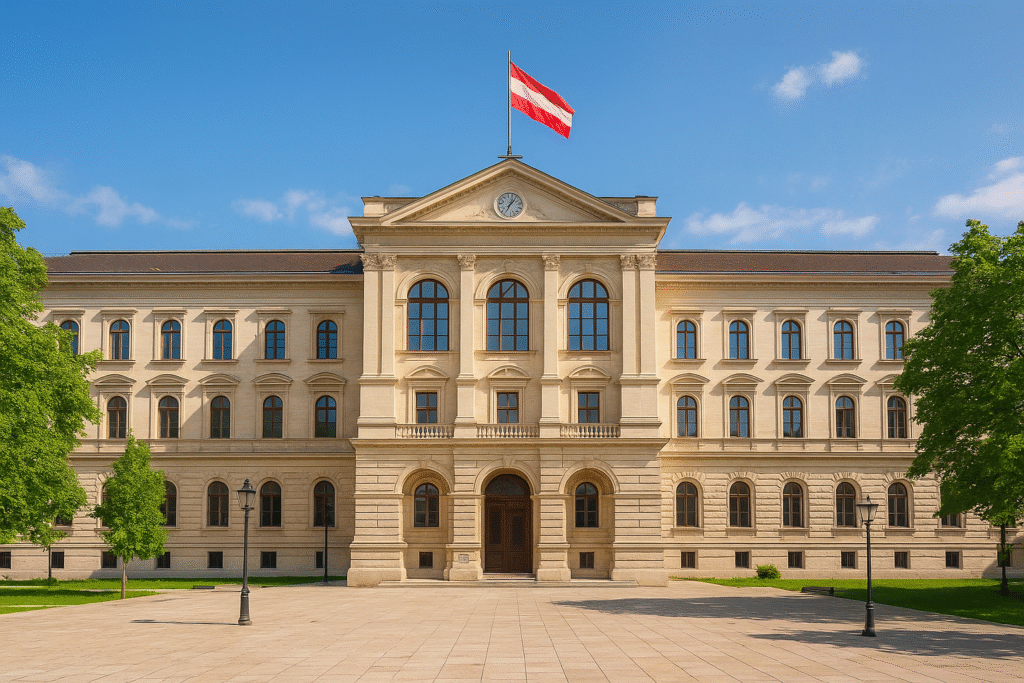Public vs Private Universities? Choosing where to study is one of the most important decisions you’ll make as a student and if Austria is on your radar, you’re already off to a strong start. The country offers a rich academic tradition, world-class universities, low tuition fees, and a high quality of life. But before you pack your bags for Vienna, Graz, or Innsbruck, there’s one major question to answer:
Should you study at a public or private university in Austria?
This guide breaks down the differences, benefits, and considerations to help you make the right choice for your academic and career goals.
Table of Contents

What You Should Know About Austrian Public vs Private Universities
Here are 8 points that’s tells you about Austrian Public vs Private Universities. This will help you understand the difference, uniqueness and benefits, hence, choosing one becomes easier after.
Understanding Austria’s Higher Education Landscape
Austria has a diverse higher education system made up of:
- 23 Public Universities (öffentliche Universitäten) – including comprehensive universities, technical universities, medical universities, and universities of the arts.
- 21 Universities of Applied Sciences (Fachhochschulen) – practice-oriented, industry-linked programs.
- 17 Private Universities (Privatuniversitäten) – independent institutions offering specialized programs.
- 14 Teacher Education Colleges (Pädagogische Hochschulen) – focused on training educators.
This variety ensures there’s something for every type of learner, whether you’re interested in pure research, applied skills, or artistic disciplines.
Tuition Fees and Costs
One of Austria’s biggest draws for students is affordability but the cost difference between public and private institutions is significant. The table below shows the cost difference between Austrian public vs private universities.
| Type | EU/EEA/Developing Country Students | Non-EU/EEA Students | Notes |
| Public Universities | Tuition-free (small €17.50- €20/semester student union fee) | ~€726–€751 per semester (€1,200–€1,500/year) | €363.36/semester surcharge if studies exceed standard duration by 2+ semesters. |
| Private Universities | €3,000–€23,000/year (some programs up to €35,000) | Same as EU students | Prices vary widely by program business and specialized programs are usually more expensive. |
Verdict: If budget is a major factor; between Austrian public vs private universitie public universities are the clear winner. However, some private universities offer merit-based scholarships that can significantly reduce costs.
Academic Focus and Teaching Style
Another significant aspect of differences between Austrian Public vs Private Universities is the teacching style adopted and academic focus. while;
Public Universities in Austria
- Strong emphasis on theoretical knowledge and research.
- Offer a broad spectrum of disciplines—everything from philosophy to engineering.
- Renowned institutions like the University of Vienna (ranked 137th QS, 15 Nobel laureates) and University of Innsbruck (mountain research leader, high proportion of international students).
- Larger classes, but extensive academic resources.
Private Universities in Austria
- More specialized programs often in business, arts, or niche technical fields.
- Smaller class sizes with personalized attention from professors.
- Curriculum may be more flexible and tailored to industry needs.
- Some have strong ties to specific sectors, leading to better internship placement.
Admissions and Selectivity
Austrian Public vs Private University admission policies vary, while public institutions having open access, private institutions implement highly competitive selection processes. Selectivity often depends on factors such as academic performance, entrance exams, language proficiency, and program demand.
Public Universities
- Generally open access for many subjects—if you meet the basic requirements, you can enroll.
- Competitive entrance exams for high-demand programs (e.g., medicine, psychology).
- May focus on prior credits more than GPA, especially for master’s programs.
- German proficiency often required for undergraduate studies; some English-taught master’s degrees available.
Private Universities
- More selective and personalized admissions—may require interviews, portfolios, or essays.
- Often more flexible for international students who don’t meet strict public university entry criteria.
- Greater likelihood of finding English-taught programs.
Student Life and Campus Experience
Student life and campus experience at a public vs private universities go beyond academics, offering opportunities for cultural exchange, extracurricular activities, and personal growth. Modern campuses often provide libraries, sports facilities, student clubs, and social events that help students build community and balance their studies with leisure.
Public University Experience
- Large, diverse student body—University of Vienna alone has ~94,000 students.
- Rich cultural exchange, especially in Vienna and Graz.
- Lower tuition means more budget for exploring Austria and Europe.
- Larger classes can make it harder to form close academic relationships without extra effort.
Private University Experience
- Smaller, close-knit community.
- Easier to build personal connections with professors and peers.
- Often modern campuses with upgraded facilities.
- May have fewer extracurricular activities than large public institutions.

Career Prospects and Networking
Public Universities
- Prestigious degrees from highly ranked institutions recognized worldwide.
- Strong reputation for research and academic careers.
- Large alumni networks, especially in Europe.
Private Universities
- Often better direct industry connections and internship opportunities.
- Alumni networks may be smaller but more targeted to specific industries.
- Career services tend to be more personalized.
Language Considerations
- Most undergraduate programs at public universities are taught in German you’ll need language proficiency to succeed.
- Many master’s programs, especially at both public and private universities, are available in English.
- Private universities tend to offer more English-taught programs overall.
Living in Austria: The City Factor
Living in Austria offers a high quality of life, with safe cities, efficient public transport, and beautiful natural landscapes. Students enjoy affordable cultural activities, vibrant social scenes, and access to a rich mix of traditions and modern European lifestyles. Your choice might also depend on where you want to live:
- Vienna: Largest student population (~190,000), cultural capital, higher living costs but still affordable by European standards.
- Graz: 30% cheaper than Vienna, vibrant student city with over 60,000 students.
- Innsbruck: Stunning Alpine setting, outdoor lifestyle, highly international student body.

Which One Should You Choose? Public vs Private Universities
Choose a Public University if you:
- Want an internationally respected degree at minimal cost.
- Are comfortable studying in German or pursuing an English-taught master’s program.
- Value research opportunities and academic prestige.
- Prefer a large, diverse campus environment.
Choose a Private University if you:
- Want small classes and close relationships with faculty.
- Need more flexible admissions.
- Prefer specialized programs in English.
- Value strong industry ties and targeted networking.
Final Word
Austria offers something rare in global higher education: world-class universities, affordable tuition, and an exceptional quality of life. Whether you can choose public vs private universities will depend on your budget, academic style, language skills, and career ambitions.
No matter your choice, studying in Austria means becoming part of a rich academic tradition in the heart of Europe surrounded by history, culture, and breathtaking landscapes.
For more information about your studying journey, visit our website



Pingback: Securing an internship while pursuing your Master’s degree in Austria - Travelling Scholars Blog